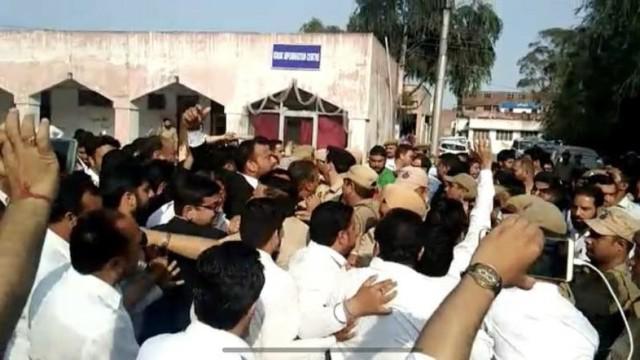Lawyers Try to Block Police from Filing Charges Against Hindu Suspects

Meenakshi Ganguly
South Asia Director mg2411
© 2018 unknown/social media
A heated scene outside a courthouse in India’s Jammu and Kashmir state unfolded yesterday, as lawyers physically attempted to stop police from filing charges against six men and a boy accused of raping and murdering Asifa Bano, an 8-year-old Muslim nomad girl.
In a statement attempting to justify their actions, the Bar Association of Kathua, the district where Asifa was abducted in January, said they wanted a federal investigation because the state government had failed to “understand the sentiments of the people.”
The police eventually managed to file charges after calling for backup.
It is extraordinary that there can be differences over “sentiment” around the gang-rape and killing of a child. But the lawyers, along with a group called the Hindu Ekta Manch, which is affiliated with India’s ruling Hindu nationalist Bharatiya Janata Party (BJP), has – instead of condemning the heinous crime – been protesting the arrest of alleged Hindu assailants, including four policemen and a retired government official.
The Indian government has in recent years adopted significant legal reforms for sexual violence cases. But major gaps remain in implementation. Human Rights Watch has found that local authorities often try and protect powerful perpetrators, pressing victims to withdraw complaints. Even so, it is shocking that the lawyers in Kathua so blatantly tried to obstruct justice in this case.
The BJP and its supporters have often spoken out strongly against sexual violence, even criticizing human rights groups who oppose the death penalty for convicted rapists. After the fatal gang rape of Jyoti Singh Pandey in 2012, where one perpetrator was a juvenile, the government ignored child rights activists and amended the law to prosecute as adults anyone over age 16 accused of heinous crimes like rape and murder.
Yet too many BJP supporters seem willing to abandon their tough stand on sexual violence on the basis of religious prejudice. The police allege Asifa’s rape and murder was part of an effort to drive the Muslim community away from the area. Yet, for the local lawyers and other BJP supporters, the Hindu suspects and the Muslim victim were grounds for blocking prosecution of the case.
The BJP has often been accused of failing to protect religious minorities against attacks by its vigilante supporters. BJP leaders can start to put to rest those claims by publicly condemning any attempts to block justice for Asifa and encourage the Jammu and Kashmir government to enact and implement the Protection of Children Against Sexual Offences Act.

